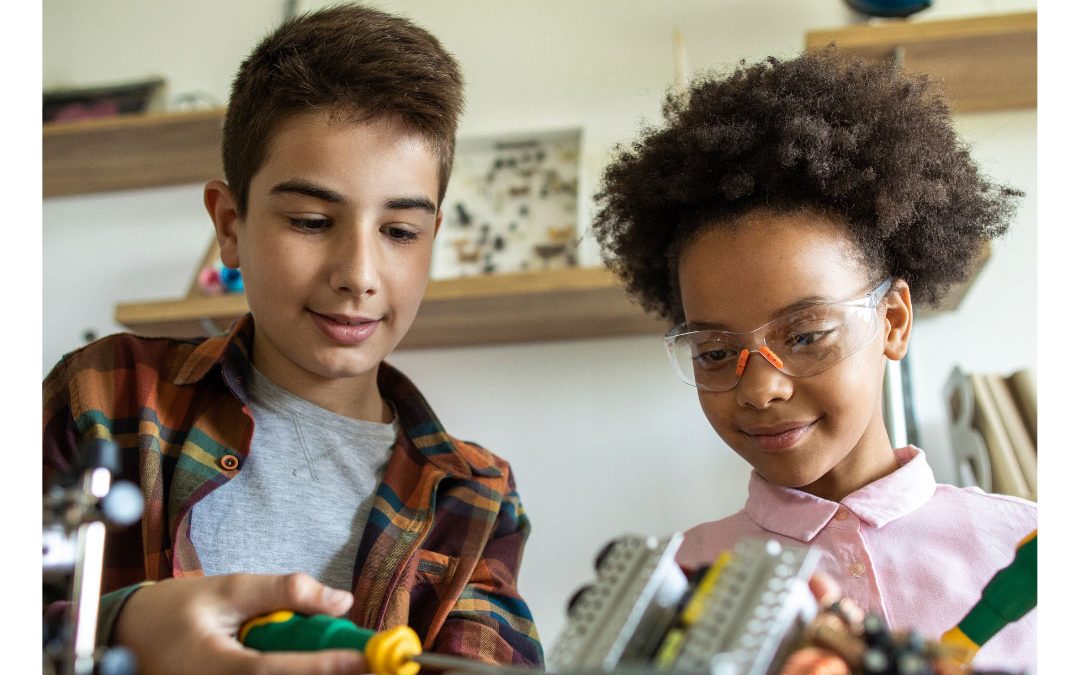Have you ever noticed how your child can recite facts about dinosaurs, recreate scenes from a favorite movie, or explain the rules of a complicated game, but may struggle to recall the math lesson you just covered?
We know that learning takes more than worksheets and simple lessons to truly stick and take root. That’s why personalized learning is so effective. Deep learning, the kind that endures, comes from doing, building, questioning, and discovering.
In our homeschool setting, we have the gift of time and flexibility. We can lean into curiosity, stretch the boundaries of a lesson, and invite our students to become creators, researchers, designers, and problem-solvers. That’s the heart of Project-Based Learning (PBL).
What Is Project-Based Learning?
Project‑Based Learning (PBL) is an approach in which students explore real‑world problems or questions over time, building skills and understanding through hands‑on exploration.
A PBL approach in science reaches beyond memorizing facts about a science concept; a student might design an experiment, build a model, or interview an expert to gain a deeper understanding of the concept. Instead of a report on a historical figure, they might become that person for a Living History Museum.
PBL helps:
- Retain knowledge and apply understanding
- Develop problem-solving and critical thinking skills
- Build confidence and independence
- Make meaningful connections across subjects
The Research Behind the Method
A growing body of research supports the impact of PBL:
- A2021 study by Lucas Education Researchfound that students in high-quality PBL classrooms outperformed peers on standardized tests across subjects, including science, social studies, and English language arts.
- Additionalresearch in AP coursesshows PBL students scored eight percentage points higher than those in traditional classrooms.
- Harvard’s Graduate School of Educationhighlights that students in PBL environments demonstrate stronger collaboration and communication skills and develop a greater sense of agency over their learning.
- Research in cognitive science shows that when students are emotionally engaged and actively involved in their learning, stronger neural connections are formed, leading to better retention and real‑world application of knowledge.
For homeschool parents, this is empowering. It means our learning isn’t limited by the traditional classroom. We can build real‑world experiences into everyday life, and they really do count.
Real Examples, Real Learning
PBL starts simply and naturally with a question, a challenge, or a passion.
- A 4th grader interested in space creates a presentation for her family on different types of rockets.
- After studying habitats in science class, a middle school student designs a backyard ecosystem.
- A high school student compares the costs of used and new vehicles, calculating insurance, maintenance, and fuel expenses to determine the most cost-effective option.
These projects, which have a tangible impact, help students learn math, writing, research, communication, and planning skills simultaneously.
Project-Based Learning Opportunities at Cottonwood
At Cottonwood, we believe in learning that comes to life. Many of our events are designed specifically for students to apply what they’re learning in meaningful and creative ways. We do this through a variety of Cottonwood Presents Events:
- Living History Museum (November):Students research a historical or public figure, create a visual display, and assume that person’s role.
- International Festival (December):Families explore a country or culture and showcase traditions, geography, and cuisine.
- Science Fair (March):Students design and conduct their experiments, practicing the scientific method.
- Makers Market (April):Young entrepreneurs create and sell handmade products, gaining experience in business, marketing, and budgeting.
These events are more than fun; they are curriculum in action. Participating in these events builds confidence, ignites interest, and demonstrates to students that their learning matters.
Project-Based Learning for Older Students: Real Life, Real Skills
For middle and high schoolers, PBL becomes even more powerful when it connects to real-world skillsand career exploration. Some examples:
- Planning a road trip, calculating mileage, costs, and timelines
- Creating a resume and preparing for a mock job interview
- Researching the steps to get a driver’s license and organizing a checklist
- Interviewing someone in a career of interest and presenting the findings
- Designing a business plan for a hobby-turned-entrepreneurial venture
These kinds of projects give students a sense of agency and purposewhile building essential life and executive functioning skills, like time management, goal setting, and adaptability.
If your teen asks, “When will I ever use this?”, project-based learning is your answer.
Try It This Month
You don’t need to overhaul your homeschool to get started. Project-based learning can begin with a simple shift:
- Start with a question or interest.
- Let your student take the lead in designing a project.
- Guide them in researching, planning, and presenting their work.
- Reflect together on what they learned and how it connects to academic goals.
And if you need inspiration, join us at an upcoming event or ask your Homeschool Teacher for ideas!
Final Thought
Project-based learning doesn’t just teach content; it teaches how to learn, create, and think. As homeschoolers at Cottonwood, we have the freedom, support, and resources to build learning that lasts, not just to meet a standard or a goal, but for life.
Let curiosity lead the way.
Kindly,
Cottonwood
More Resources to Explore
- PBLWorks: What is PBL?
- Homeschool Project-Based Learning Resources
- Benefits of Project-Based Homeschooling
- Project-Based Learning Guide for Parents
Research Citations for Project-Based Learning
- Lucas Education Research (2021):
Project-Based Learning Boosts Student Achievement in AP Courses. A large-scale study found that students in high-quality PBL classrooms outperformed peers on standardized tests across subjects, including science, social studies, and English language arts. - Harvard Graduate School of Education – Instructional Moves:
Project-Based Learning Harvard’s research shows that students engaged in PBL develop stronger collaboration and communication skills, as well as a greater sense of agency in their learning. - Edutopia – Research Review:
Research Validates Project-Based Learning Backed by neuroscience. Edutopia explores how emotionally engaging and hands-on learning experiences enhance brain development and long-term knowledge retention.

